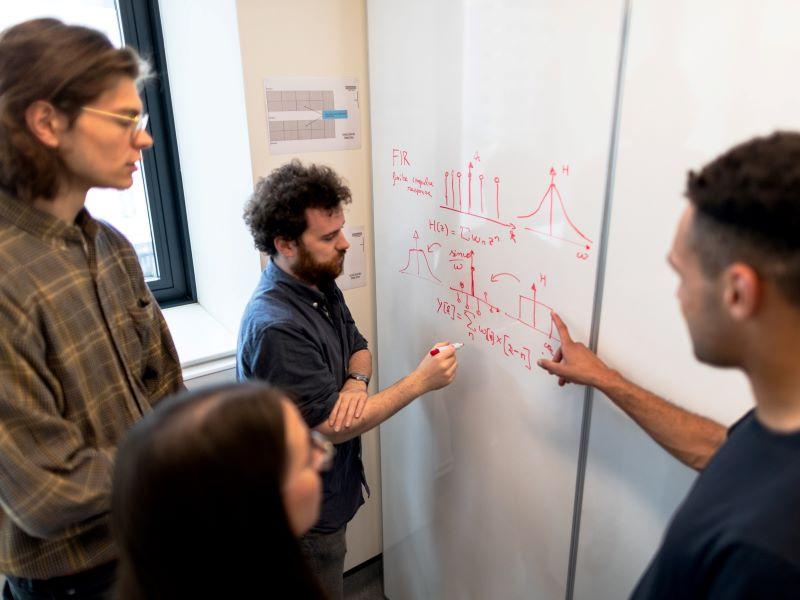
Peer review in multilingual classes
Many students, domestic and international, are not used to peer review or group work. We can help students with explicit instruction on how to provide and accept feedback on each other’s work. While some researchers note that, among other difficulties, non-native English-speaking peer reviewers are often unable to give useful, concrete feedback or that the implementation of peer review is too complex to be of much use in English as a second language (ESL) environments, other research suggests peer review can be a helpful tool for multilingual students. I believe that, with explicit instruction and modelling, peer review can benefit all students.
University writing classes often use peer review as a guide to revision, yet they do not enquire into the criteria on which the feedback is based. Here peer review refers to the process of students editing for mistakes and giving feedback on other students’ writing, providing writers with pointers beyond the instructor’s comments. In many English writing courses, teachers assign peer review activities and assume that students are familiar with this practice from high school. Students in many classes conduct peer reviews or write collaboratively online with students in other countries. But we cannot assume students know how to effectively review one another’s work. Teachers need to provide explicit guidance on how to comment on peers’ papers for revision.
How to guide students in effective peer review
To introduce meaningful peer review, instructors should maximise the opportunity for feedback by asking students to read one another’s drafts and spend time in their peer review groups discussing the draft, not giving only written comments to the author.
To aid these discussions and peer feedback in general, we must guide students to be open to different perspectives and explain the importance of underlying cross-cultural communication differences such as direct or indirect conversational styles, telling different types of stories in different narrative styles and indicating a stance or attitude in different ways.
- Breaking language barriers: supporting non-native English-speaking students
- Introducing ‘translanguaging’ – and other ways to promote multilingualism
- Bringing international and intercultural dimensions into your programmes
Students will struggle to grasp counter-argument until they are open to understanding other perspectives and to putting themselves in the position of the reader or audience, who may not agree with them. When learning how to incorporate counter-argument in my second-language writing classes, students sometimes believe that it is the goal to change sides in the argument and argue both sides. Other students avoid the counter-argument entirely, thinking it will weaken their position.
For the student reviewers, explain that when feeding back on peers’ work they should try to help them see other sides to their argument that they might not have considered. They should explain what key points they drew as they read the essay. Where students identify issues or problems in a draft, they must consider how to help the author address or solve those problems. Ask reviewers to provide specific suggestions and articles where possible.
For the students who are being reviewed, explain that they must honour the reactions of their audience. Highlight the value of access to a real, live audience of people who can respond to them in real time, giving them an insight into the impact of their work on a reader. Encourage the students to ask reviewers to answer specific questions about their work.
International students, especially those from non-Western cultural traditions, might have a different understanding of cultural discourse, written English, organisational patterns and styles.
To ensure students do not feel isolated in their struggles with writing, encourage them to share what they have found difficult within their groups. They will often find that their struggles are shared by nearly everyone else.
Encourage reviewers to keep the “big picture” in mind and focus initial feedback on macro issues such as the structure and overall line of reasoning, before they spend time on more surface-level errors of grammar and style. They should focus on how easily they are able to track the discussion or argument. To help guide students on the issues to address, provide students with feedback sheets designed for each peer review session.
My own research has found that peer review enhances native English speakers’ acceptance of multilingual and multicultural writing styles. The main concerns of native English-speaking students when working with multilingual peers’ papers were in the use of emotional appeal, bias and perspective. They were not as bothered by wording or grammatical differences.
Multilingual students tend to rely more on pathos and emotional appeal in their writing, my research has shown. This should be embraced as a strength. By capitalising on international students’ voice, originality and diversity, we can bring dimensions to the classroom that we might otherwise lack.
So educators should aim to harness this passion by asking students to write from their own experiences, evoking multiple rhetorics and bringing in non-English words and phrases.
Specifically, we can construct assignments with open-ended topics that ask students to draw on their own experiences as evidence. Prompts that encourage multiple perspectives on a given issue, encourage curiosity, openness, creativity and flexibility benefit from peer input.
The writing process should involve multiple drafts, with students revising their work based on specific feedback. Ask authors to articulate how they will draw on peer advice in the next draft. Ask them to provide a series of “action items” for their writing and research.
Andrea Feldman is a teaching professor of distinction and coordinator for international student services at the University of Colorado Boulder.
If you found this interesting and want advice and insight from academics and university staff delivered direct to your inbox each week, sign up for the Campus newsletter.




